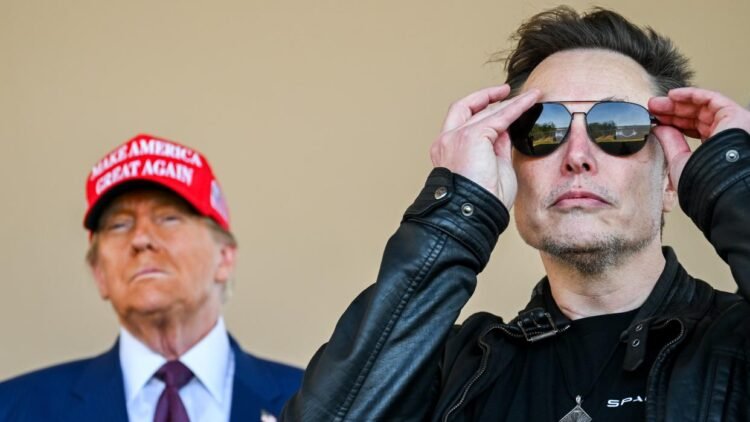WASHINGTON (AP) — When Elon Musk took charge of Donald Trump’s initiative to streamline the federal government, he promised openness and transparency. “It’s not going to be some secret backroom thing,” he assured last year, even suggesting that meetings might be streamed online.
That hasn’t happened.
Since Trump’s return to the White House, Musk has quietly entrenched himself within federal agencies while avoiding public scrutiny. He has not answered media questions, testified before Congress, or provided clear details on his Department of Government Efficiency (DOGE), the entity tasked with overhauling government operations. Meanwhile, his team has sidelined career officials and embedded themselves in key agencies without clear oversight.
The lack of transparency is raising alarms about Musk’s unchecked influence. Donald K. Sherman, executive director of Citizens for Responsibility and Ethics in Washington, warned that “Trump has given Musk unprecedented power over government systems with maximum secrecy and little accountability.”
The White House insists DOGE is operating transparently, citing cost-cutting measures such as canceling unnecessary contracts and shutting down underused federal buildings. House Republicans also pointed to Musk’s team uncovering Social Security payments to individuals listed as 150 years old as proof of their effectiveness.
But the methods remain a mystery. Musk’s deepening role in government has little public oversight, and key decisions—like cutting funding to the U.S. Agency for International Development—have been made behind closed doors.
Musk’s Influence Grows as Critics Push for Oversight
Despite concerns, Trump is fully backing Musk’s aggressive approach.
“He’s finding tremendous fraud, corruption, and waste,” the president said Friday. Asked if Musk should answer public questions about his work, Trump responded, “Oh sure… Elon’s not shy.”
That certainly seems true on social media. Musk’s X account is filled with memes, attacks on critics, and strong endorsements of Trump’s agenda. On Saturday, he declared: “This administration has one chance for major reform that may never come again. It’s now or never.”
Musk’s rise from PayPal co-founder to Tesla, SpaceX, and X (formerly Twitter) CEO has been defined by disruption. Now, he appears to be applying the same approach to Washington—shaking up bureaucracies, pushing aside longtime employees, and operating largely behind the scenes.
At the Treasury Department, FEMA, the Department of Veterans Affairs, and other agencies, DOGE teams have appeared without announcement. Some employees have reported seeing unfamiliar faces in the hallways, unsure of their purpose.
At the Education Department, DOGE staff have set up operations in a conference room near the secretary’s office. But even federal union leaders say they have no idea what they are working on.
“It’s the lack of transparency that’s alarming,” said Sheria Smith, president of a union representing Education Department employees.
Meanwhile, DOGE workers appear confident in their authority. Employees have been seen exchanging high-fives and carrying out their work without engaging with existing agency staff.
“They don’t seem to answer to anyone,” Smith added.
Who’s Really in Charge?
Musk himself has mostly remained at the White House complex, where he has an office. His influence extends beyond government streamlining—he has key allies advising Trump on AI and cryptocurrency policies, including investor David Sacks.
“The whole room was full of young coders,” Sacks said after visiting DOGE’s offices. “The facilities people didn’t know what to do because they’d never had people ask to stay late on a Friday night before.”
Journalists have identified many DOGE employees as Musk loyalists with tech and engineering backgrounds, including former Tesla and SpaceX staffers. Musk has warned that revealing their identities is a crime, though he has not cited any legal justification.
Trump’s interim U.S. Attorney, Ed Martin, reinforced Musk’s warning, stating the administration would “pursue legal action against anyone who impedes your work or threatens your people.” Martin later thanked Musk for referring cases of alleged government property theft, though no additional details were provided.
Energy Secretary Chris Wright defended Musk’s approach, calling DOGE a “team of young gun consultants taking a critical look at how things are run.”
Yet, Musk’s role in government remains murky. It took over two weeks after Trump’s January 20 inauguration to confirm that Musk had formally joined the administration as a special government employee.
Even now, his financial disclosure report remains secret—despite the fact that SpaceX holds multi-billion-dollar contracts with the Pentagon. Musk is now set to review military spending, raising questions about whether his government role could conflict with his personal business interests.
Blocked Oversight and Political Divide
Democrats have attempted to subpoena Musk to testify before Congress, but Republicans blocked the effort.
Rep. Gerald Connolly (D-VA) questioned Musk’s unchecked power:
“Who is this unelected billionaire, that he can dismantle federal agencies, fire people, and make sweeping changes without congressional oversight?”
House Democratic Leader Hakeem Jeffries accused Republicans of enabling “an out-of-control billionaire puppet master.”
Trump, however, dismissed these concerns, insisting that Musk operates under his direction.
“I tell him to go here, go there—he does it,” Trump said. “We have to take some of these things apart to find the corruption.”

 English
English



























































